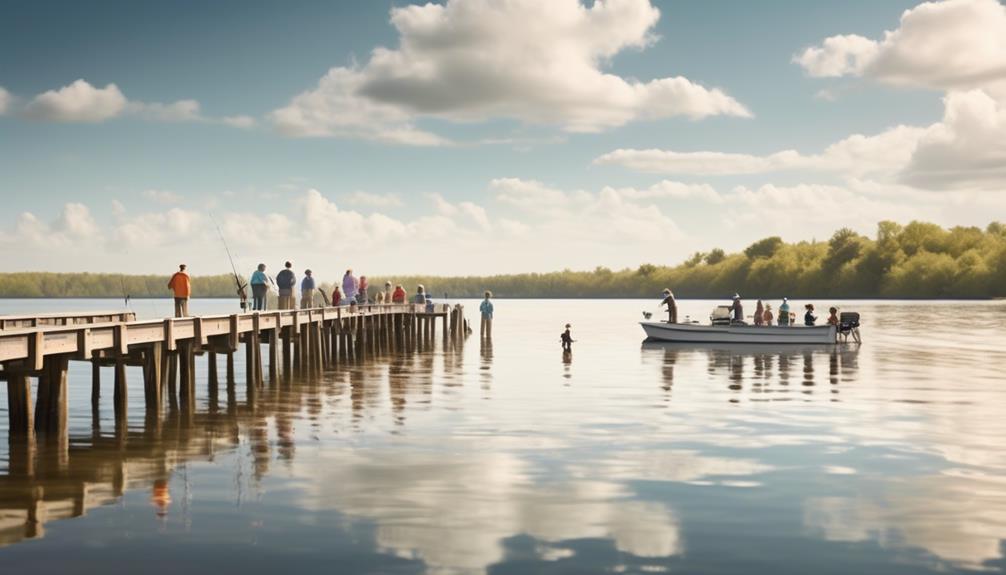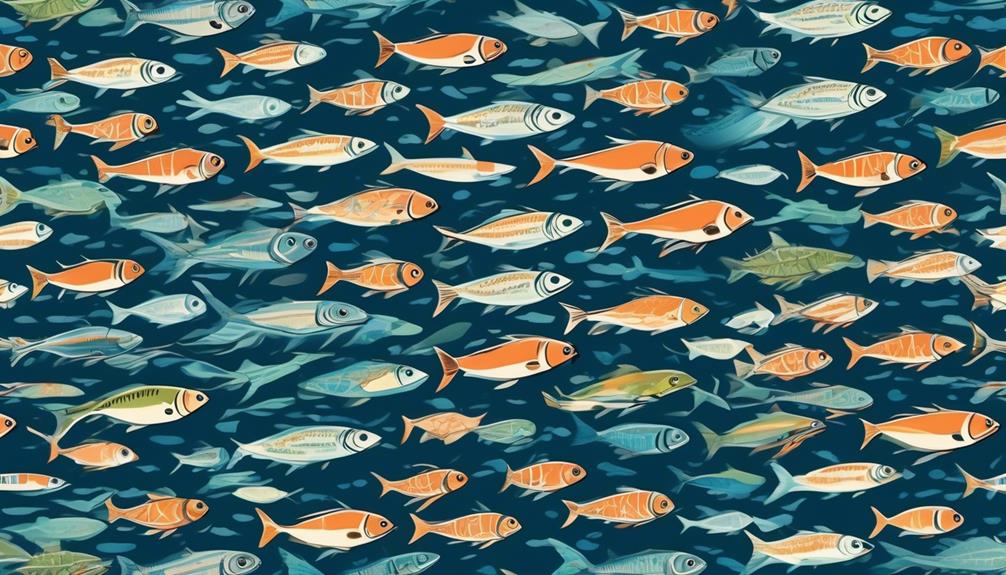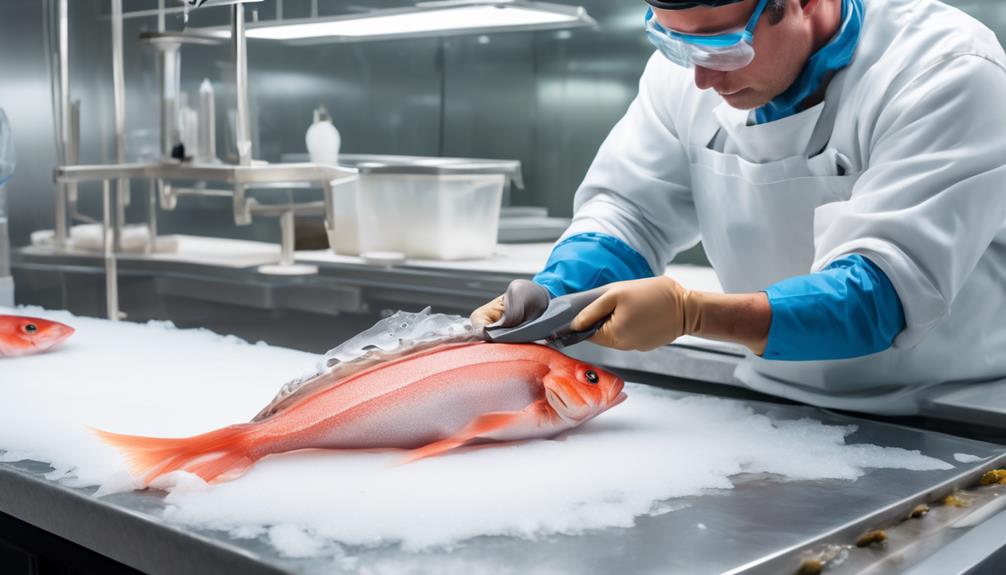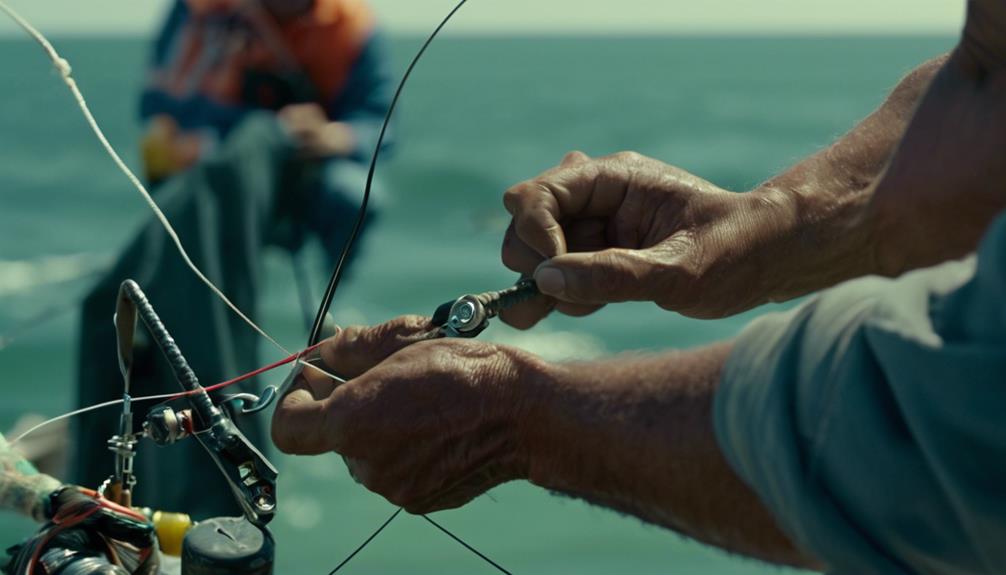If you've ever found yourself standing at the water's edge, contemplating the thrill of casting a line into the depths, you've likely pondered the age-old debate of saltwater versus freshwater fishing.
The differences between these two types of fishing go beyond just the location of the water. As you consider the various aspects that set saltwater and freshwater fishing apart, you'll discover how these differences can significantly impact your overall fishing experience.
So, let's explore the key points that can help you make an informed decision about which type of fishing suits you best.
Location Differences
When fishing in saltwater, you'll often find yourself casting your line from a boat or a pier, while in freshwater, you might be wading in a river or standing on the shore of a lake. The location differences between saltwater and freshwater fishing are influenced by climate variances and geographical constraints.
Saltwater fishing often takes place in coastal areas with a milder climate, while freshwater fishing can occur in a broader range of geographical locations, from mountain streams to vast lakes.
Saltwater fishing is significantly impacted by tidal fluctuations and water depth. Tides play a crucial role in saltwater fishing as they affect the movement and behavior of fish. The depth of the water in saltwater fishing locations can vary greatly, from shallow flats to deep channels, requiring different techniques and equipment.
In contrast, freshwater fishing locations are less affected by tides and typically have more consistent water depth, although this can also vary based on the specific body of water.
In terms of climate differences, saltwater fishing locations are often characterized by more stable and moderate temperatures due to the proximity to the ocean, whereas freshwater fishing locations can experience more extreme temperature variations based on their geographical location.
Geographical constraints also play a role, with saltwater fishing limited to coastal regions, while freshwater fishing can be pursued in a wider variety of terrains, including rivers, lakes, and ponds.
Fish Species Diversity
Saltwater fishing offers a wider variety of fish species compared to freshwater fishing. In saltwater, you can expect to encounter an array of species such as tuna, marlin, snapper, grouper, and salmon, each with its own unique characteristics and behaviors. Freshwater fishing, on the other hand, typically offers a more limited selection of species, like bass, trout, catfish, and perch.
This diversity in saltwater fishing provides anglers with the opportunity to target a wider range of fish, each with its own bait preference and habitat comparison. Saltwater fish often require different types of bait and are found in various habitats, from shallow coastal areas to deep ocean waters. On the other hand, freshwater fish tend to have more specific preferences in terms of bait and are usually found in lakes, rivers, and streams.
In addition to the variety of species, catch size and fishing regulations also differ between saltwater and freshwater fishing. Saltwater fish, due to their habitat and diet, generally grow larger than their freshwater counterparts. This often leads to the excitement of reeling in a bigger catch while saltwater fishing. Moreover, fishing regulations and limits for saltwater and freshwater fishing can also vary, with saltwater regulations often being more complex due to the migratory nature of some saltwater species.
Understanding these differences can help anglers make informed decisions when choosing between saltwater and freshwater fishing experiences.
Equipment Variation
To effectively fish in both saltwater and freshwater environments, it's essential to understand the differences in equipment required for each type of fishing. When it comes to tackle preference, saltwater fishing often requires heavier and more durable gear due to the size and strength of saltwater fish. Freshwater fishing, on the other hand, allows for the use of lighter tackle, making it a great starting point for beginners.
Your skill level also plays a significant role in equipment variation. Saltwater fishing demands more advanced angling skills to handle the powerful fish and the challenges of the open sea, while freshwater fishing can be more forgiving for those still honing their abilities.
In terms of gear maintenance, saltwater fishing gear needs more frequent cleaning and maintenance due to the corrosive nature of salt. Freshwater gear, though still requiring care, generally faces less risk of corrosion.
When considering boat size, saltwater fishing often necessitates larger boats to handle the rougher waters and longer journeys to prime fishing spots. In contrast, smaller boats are often sufficient for freshwater fishing, as the calmer waters and shorter distances don't demand as much space or stability.
Understanding these equipment variations between saltwater and freshwater fishing is crucial for ensuring a successful and enjoyable fishing experience in both environments. Whether it's selecting the right tackle, maintaining your gear, or choosing the appropriate boat size, being informed about these differences will help you make the most of your fishing adventures.
Techniques and Methods
Mastering the art of casting and retrieving is essential for both saltwater and freshwater fishing.
In saltwater fishing, casting accuracy is crucial due to the vastness of the open waters and the need to reach specific targets such as reefs, wrecks, or feeding fish. Long casting distances are often necessary to reach these targets, so using the proper casting techniques and adjusting for wind and current conditions is important.
In contrast, freshwater fishing often involves more precise casting to specific spots such as under overhanging trees, along the edge of aquatic vegetation, or to a certain depth.
Bait selection is another key aspect of fishing techniques.
In saltwater fishing, live bait such as shrimp, mullet, or sardines is commonly used due to the variety of predatory fish species that inhabit these waters. Additionally, artificial lures like topwater plugs, jigs, and soft plastic baits are popular choices.
In freshwater fishing, bait selection varies depending on the targeted species and can include live bait such as worms, minnows, or insects, as well as artificial lures like spinners, spoons, and crankbaits. Understanding the behavior and feeding habits of the fish species in each environment is crucial for selecting the most effective bait.
Cost and Expenses
Considering the overall cost and expenses, freshwater fishing tends to be more budget-friendly compared to saltwater fishing due to factors such as gear, tackle, and travel costs.
When planning your fishing budget, freshwater fishing often requires less investment in gear and tackle. Freshwater fishing gear such as rods, reels, and lines tends to be less expensive than their saltwater counterparts. Additionally, tackle expenses for freshwater fishing are generally lower since the lures and baits used are simpler and less specialized than those used in saltwater fishing.
Travel costs also play a significant role in the budget planning for fishing trips. Saltwater fishing often involves longer travel distances to reach the ocean or specific saltwater fishing destinations, leading to higher transportation and accommodation expenses. On the other hand, freshwater fishing spots are often more accessible and closer to home, reducing the need for extensive travel and lowering associated costs.
Furthermore, gear maintenance is an essential aspect to consider when evaluating the expenses of fishing. Saltwater fishing gear requires more frequent and thorough maintenance due to exposure to corrosive saltwater, leading to higher long-term costs. Freshwater gear, while still requiring maintenance, generally experiences less wear and tear, resulting in lower maintenance expenses over time.
Environmental Impact
When selecting a fishing style, it's important to be mindful of the environmental impact each method may have.
In saltwater fishing, conservation efforts and sustainability have become increasingly important due to overfishing and habitat degradation. Many saltwater fish populations have declined, leading to strict regulations to protect species and ecosystems. Sustainable practices such as catch and release, and using circle hooks to minimize harm to fish, are being encouraged to preserve marine environments.
On the other hand, freshwater fishing also faces environmental challenges. Pollution from agricultural runoff and industrial waste can harm freshwater habitats and fish populations. Habitat destruction, caused by factors such as dam construction and deforestation, also poses a significant threat to freshwater ecosystems. Efforts to mitigate these impacts include habitat restoration projects and water quality improvement initiatives. Additionally, stocking programs for popular game fish aim to replenish populations affected by overfishing and habitat loss.
Both saltwater and freshwater fishing have the potential to negatively impact the environment, but through conservation efforts and sustainable practices, anglers can help protect fish populations and their habitats. Whether you prefer the open sea or serene lakes, being mindful of the environmental impact of your fishing activities is crucial to ensure the sustainability of this beloved pastime for future generations.
Accessibility and Availability

You can easily find freshwater fishing spots in your local area, making it a convenient and accessible option for anglers of all levels. Unlike saltwater fishing, which often requires access to a boat or a significant journey to the coast, freshwater fishing offers more accessible locations, including lakes, rivers, ponds, and streams, which are typically closer to residential areas. This accessibility allows for more frequent and spontaneous fishing trips, as you can easily visit these spots after work or on weekends without extensive planning.
- Benefits of freshwater fishing accessibility:
- Opportunity for quick and impromptu fishing trips
- Reduced travel time and costs compared to saltwater fishing excursions
When it comes to accessibility, fishing regulations also play a crucial role. Freshwater fishing locations often have clear and easily accessible information about local fishing regulations, making it easier for anglers to understand the rules and requirements. This transparency allows you to plan your fishing trips with confidence, knowing that you're complying with all relevant regulations.
Additionally, many freshwater locations promote catch and release practices, which contribute to the sustainability of fish populations and the overall health of the ecosystem. This emphasis on conservation and responsible angling ensures that these accessible fishing spots remain abundant with fish for future generations to enjoy.
Fishing Experience
Freshwater fishing's accessibility not only offers convenient locations but also contributes to a richer and more diverse fishing experience for anglers. When it comes to catch variety, freshwater fishing provides a wide range of species to target, from largemouth bass and trout to catfish and crappie. This diversity allows for anglers to experience different fishing techniques and challenges, making each trip unique and exciting. Additionally, the varying water conditions in freshwater bodies such as rivers, lakes, and ponds create a dynamic environment for fishing. You may encounter calm, clear waters in one location, and fast-flowing, murky waters in another, offering a diverse set of challenges and experiences.
On the other hand, in saltwater fishing, the catch variety is often more extensive, with opportunities to target species such as tuna, marlin, snapper, and grouper. The ocean's vastness and depth can provide an exhilarating experience when reeling in large, powerful fish. However, the water conditions in saltwater fishing can also be more unpredictable, with factors such as tides, currents, and weather playing a significant role in the fishing experience. This can add an element of adventure and unpredictability to your outings.
Frequently Asked Questions
How Does the Taste of Saltwater Fish Compare to Freshwater Fish?
When it comes to taste comparison, saltwater fish is often described as having a bolder, more distinct flavor compared to freshwater fish. Cooking methods can greatly influence the taste of both types.
What Are the Differences in Boat Size and Type Needed for Saltwater Vs Freshwater Fishing?
When fishing in saltwater, you'll need a larger boat due to the rougher conditions and bigger fish. The equipment needed for saltwater fishing includes heavy-duty rods, reels, and lines to handle the stronger and more aggressive marine species.
Are There Different Regulations and Restrictions for Saltwater and Freshwater Fishing?
When fishing, regulations and restrictions differ between saltwater and freshwater. Enforcement and monitoring ensure compliance, promoting conservation, sustainability, and ecosystem health. Management aims to preserve the balance of aquatic life in each environment.
Do Saltwater and Freshwater Fishing Require Different Types of Bait and Lures?
When fishing in saltwater versus freshwater, bait selection and fishing techniques differ. In saltwater, you often use live bait and lures that mimic natural prey due to the variety of species and their feeding habits.
How Does the Weather and Tides Affect Saltwater Fishing Compared to Freshwater Fishing?
The effect of currents, moon phases, impact of wind, and water temperature fluctuations in saltwater fishing differ from freshwater. Tides play a crucial role in saltwater, affecting fish movement and feeding patterns, while freshwater is less influenced by tides and more by weather conditions.
Conclusion
So, whether you prefer the thrill of reeling in a big game fish in the open ocean or the tranquility of catching freshwater bass in a serene lake, both saltwater and freshwater fishing offer unique experiences.
Each has its own set of challenges and rewards, making them both worthwhile pursuits for any angler.
Ultimately, the choice between saltwater and freshwater fishing comes down to personal preference and the type of fishing experience you're seeking.
Happy fishing!



